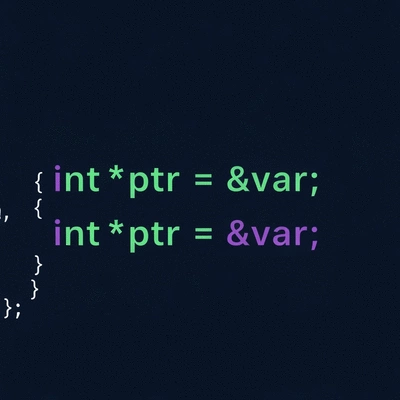What if mastering programming syntax could save you hours of debugging? A firm grasp of pointers in C and C++ can significantly enhance your coding efficiency. Let’s dive into the essential lessons from our exploration of pointer declarations.
What You Will Learn
- Pointers are variables that store the address of another variable, crucial for efficient memory management.
- The syntax for declaring pointers, such as `int *x` vs. `int* x`, reflects stylistic preferences that impact code clarity.
- The address operator (&) is essential for initializing pointers by obtaining the memory address of a variable.
- Understanding pointer binding and dereferencing is vital to avoid common programming pitfalls and ensure code safety.
- Using null pointers can help prevent segmentation faults by indicating that the pointer is not assigned to valid memory.
C/C++ Pointer Declaration Styles and Usage
This visual explores the two common stylistic preferences for pointer declaration in C/C++, the role of the address operator, and key takeaways for effective pointer usage.
Declaration Styles: `int *x` vs. `int* x`
Two primary styles for declaring pointers, both valid but with different community perceptions.
Address Operator (`&`) in Context
The `&` operator is crucial for obtaining a variable's memory address for pointer assignment.
Key Takeaways for Pointer Usage
Summarizing crucial aspects for effective and safe pointer programming in C/C++.
- Pointers hold memory addresses for efficient memory management.
- Consistency in declaration style (`int *x` or `int* x`) improves readability.
- `&` operator gets address; `*` operator dereferences to access value.
- Null pointers prevent segmentation faults by indicating no valid memory.
Understanding Pointer Declaration in C and C++
When diving into the world of programming, particularly in languages like C and C++, you'll encounter a concept that's both fundamental and powerful: pointers. Pointers are variables that store memory addresses, allowing for dynamic memory management and more efficient handling of data structures. Understanding the intricacies of pointer declaration is crucial, as it not only affects how your program runs but also influences readability and maintenance. For a comprehensive overview of pointers, you can refer to the Wikipedia article on pointers.
So, why does the syntax matter? A well-structured pointer declaration can make your code easier to understand at a glance. This becomes increasingly important as programs grow larger and more complex. In the following sections, we’ll break down the syntax and provide clarity on best practices.
What is a Pointer and Why Does Syntax Matter?
A pointer is a variable that holds the address of another variable. This allows for flexibility in data manipulation, such as passing large structures to functions without incurring the cost of copying. The syntax you choose for declaring pointers is not just a matter of preference; it deeply impacts readability and can prevent common programming errors.
- Memory Efficiency: By using pointers, you can avoid copying large data structures in memory.
- Dynamic Memory Management: Pointers enable the allocation and deallocation of memory during runtime.
- Data Structure Manipulation: Pointers are fundamental in the implementation of complex data structures like linked lists and trees.
As I often remind my readers at The Stone Builders Rejected, understanding these concepts is key to becoming a proficient programmer in C and C++. Let's further explore the syntax itself.
Decoding the Syntax: `int *x` vs. `int* x`
When it comes to declaring pointers, you may notice variations in syntax, such as `int *x` versus `int* x`. While both serve the same purpose—declaring a pointer to an integer—there are subtle differences in how they're perceived in the programming community. The first style (`int *x`) suggests that the asterisk belongs to the variable, whereas the second style (`int* x`) implies that the type is a pointer. Both are valid, but they cater to different stylistic preferences. For more details on C pointers, W3Schools offers an excellent guide.
- int *x: Emphasizes that *x is a pointer, making the declaration clearer when multiple pointers are declared in one line.
- int* x: Suggests that the type is a pointer to an integer, which can be a more concise way to express the type.
- Ultimately, the choice between these styles may come down to personal or team coding standards.
In my experience, choosing one style and being consistent can make your codebase significantly easier to maintain. The key is clarity over confusion!
Address Operator in Pointer Context
The address operator (&) plays a crucial role when working with pointers. It allows us to obtain the memory address of a variable. For instance, if we have an integer variable `int a = 5;`, using `&a` gives us the address of `a`, which can then be assigned to a pointer.
- Initialization: Using the address operator is essential when initializing a pointer with the address of an existing variable.
- Dereferencing: The asterisk (*) is then used to access the value stored at that address, effectively dereferencing the pointer.
- Pointer Safety: Always ensure the pointer is initialized before dereferencing, as doing otherwise can lead to segmentation faults.
As we move forward, I encourage you to keep these principles in mind. Addressing pointers correctly will pave the way for more robust and error-free programming!

Exploring Pointer Binding and Variable Declaration
Now that we have a solid understanding of pointers and their declarations, let’s delve deeper into how they bind to variable names and the common pitfalls associated with them.
Pro Tip
Consistency in your pointer declaration style can greatly improve code readability. Whether you choose `int *x` or `int* x`, stick with one format throughout your project. This practice not only enhances clarity but also helps prevent confusion, especially for those reviewing your code later on. For further reading on C style and coding standards, a Cornell University resource on C style provides valuable insights.
Frequently Asked Questions about C/C++ Pointer Declarations
What is a pointer in C/C++?
A pointer is a variable that stores the memory address of another variable. This allows for direct memory manipulation, dynamic memory management, and efficient handling of data structures.
What are the two common stylistic preferences for declaring pointers?
The two common styles are `int *x` and `int* x`. The `int *x` style emphasizes that `*x` is the pointer, while `int* x` suggests that `int*` is the pointer type. Both are syntactically valid, and the choice often depends on personal or team coding standards.
What is the purpose of the address operator (`&`)?
The address operator (`&`) is used to obtain the memory address of a variable. This address is then assigned to a pointer variable during its initialization.
What is dereferencing a pointer?
Dereferencing a pointer involves using the asterisk (`*`) operator to access the value stored at the memory address the pointer holds. For example, if `ptr` points to an integer variable, `*ptr` would give you the integer value.
Why is it important to initialize pointers, and what is a null pointer?
It is crucial to initialize pointers to avoid undefined behavior and segmentation faults. A null pointer is a pointer that does not point to any valid memory address. Assigning `NULL` (or `nullptr` in C++) to a pointer indicates that it is not currently associated with an object or function, helping to prevent errors.
Summarizing Key Takeaways on Pointer Declarations
As we wrap up our exploration of pointer declarations, it's essential to reflect on the key concepts we've discussed. Understanding pointers can enhance your programming skills and make you more adept at navigating C and C++. Here’s a concise summary:
- Pointers are variables that hold the address of another variable, playing a crucial role in memory management.
- The way you declare a pointer—whether `int *x` or `int* x`—may seem trivial, but it reflects stylistic preferences in C and C++ programming.
- The address operator (&) is fundamental for initializing pointers, allowing you to obtain the memory address of a variable.
- Misunderstandings often arise concerning pointer binding and dereferencing, which are vital for effective pointer usage.
- Null pointers are significant as they prevent segmentation faults by indicating that the pointer is not currently pointing to any valid memory.
These points collectively highlight the importance of understanding pointer declarations and their nuances. Whether you're a beginner or someone looking to refresh your knowledge, grasping these fundamentals is key to mastering C and C++ programming.

Further Reading and Resources
If you're eager to dive deeper into the world of pointers and memory management, I've compiled a list of resources that can expand your understanding:
- Learn C - A free interactive C tutorial
- CPlusPlus.com - Pointers tutorial
- GeeksforGeeks - In-depth guide on pointers in C
- TutorialsPoint - Dynamic memory allocation in C
These resources are fantastic for gaining practical insights and advancing your programming skills. Feel free to explore them at your own pace!
Join the Discussion: Share Your Thoughts on Pointer Syntax
I’d love to hear from you! What are your experiences with pointer declaration in C and C++? Do you prefer the `int *x` style, or does `int* x` resonate more with you? As the owner of The Stone Builders Rejected, I believe that sharing knowledge enriches our learning journey. Let’s create a community around programming where we can learn from each other’s insights!
Please drop your thoughts and experiences in the comments below. Together, we can uncover more about the fascinating world of pointers!
Recap of Key Points
Here is a quick recap of the important points discussed in the article:
- Pointers are variables that hold the address of another variable, playing a crucial role in memory management.
- The way you declare a pointer—whether
int *xorint* x—may seem trivial, but it reflects stylistic preferences in C and C++ programming. - The address operator (&) is fundamental for initializing pointers, allowing you to obtain the memory address of a variable.
- Misunderstandings often arise concerning pointer binding and dereferencing, which are vital for effective pointer usage.
- Null pointers are significant as they prevent segmentation faults by indicating that the pointer is not currently pointing to any valid memory.






